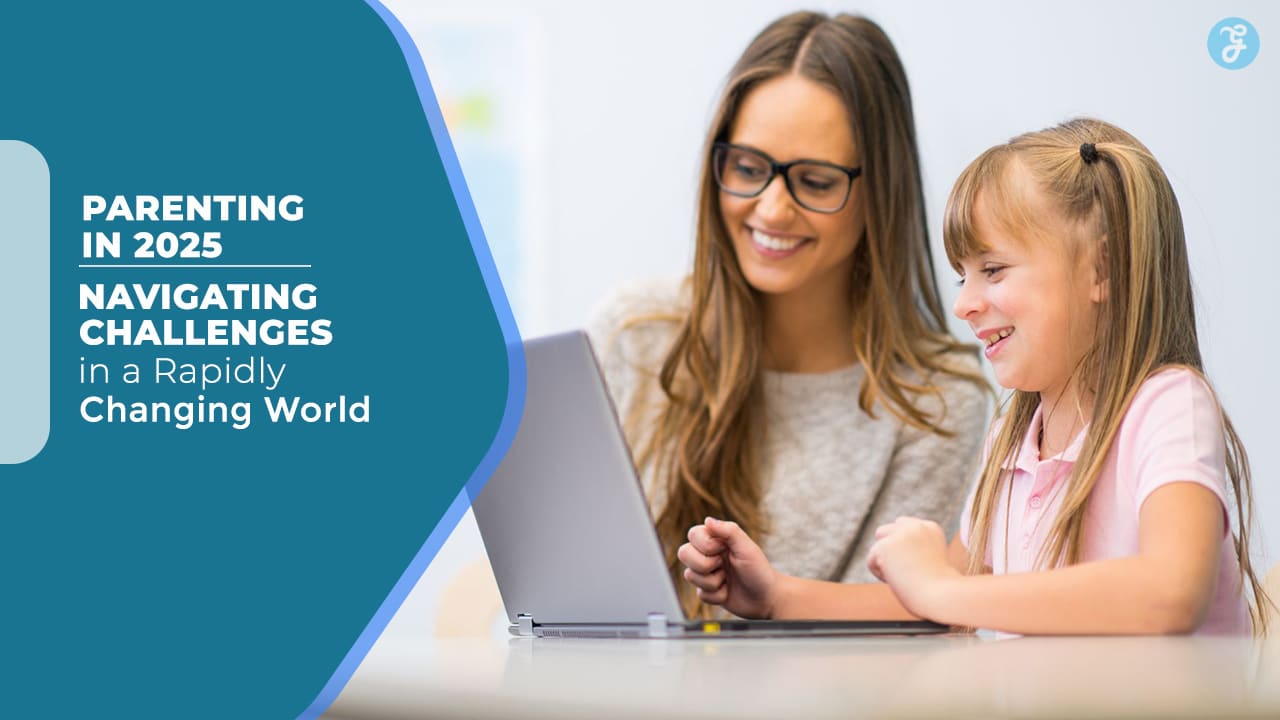Parenting has always been a demanding role, but in 2025, it comes with a new set of challenges and opportunities. Rapid advancements in technology, evolving societal norms, and global issues are reshaping the parenting landscape.
This guide provides valuable insights and practical strategies to help parents navigate these changes and raise resilient, well-rounded children. By incorporating Parenting Tips for a Changing World, this guide aims to empower parents with actionable advice.
Parenting Tips for a Changing World
The world is evolving at an unprecedented pace, bringing both opportunities and challenges for parents. Key shifts include:
- Technological Advancements: AI, automation, and digital tools are transforming education, entertainment, and household management.
- Mental Health Awareness: Greater emphasis on emotional well-being for both parents and children.
- Global Challenges: Climate change, social justice movements, and economic uncertainty influence family dynamics.
Key Societal Shifts Impacting Parenting
| Shift | Impact on Parenting |
|---|---|
| Technological advancements | Increased reliance on AI-driven learning tools. |
| Mental health awareness | Focus on fostering emotional resilience in children. |
| Sustainability movements | Teaching eco-conscious values becomes essential. |
| Remote work culture | Balancing work and family time is more challenging. |
Navigating Technology and Screen Time
Technology is deeply embedded in modern life, offering both benefits and challenges. Managing screen time is critical for children’s development.
Tips for Managing Screen Time
- Set Clear Boundaries: Define specific times and durations for screen use.
- Encourage Alternative Activities: Promote hobbies, outdoor play, and creative pursuits.
- Use Parental Controls: Leverage tools to monitor and limit usage.
- Engage in Tech-Free Zones: Create areas or times in the house where no screens are allowed.
Parenting Tips for a Changing World emphasize finding a balance between technology use and other enriching activities to foster well-rounded development.
Recommended Screen Time by Age Group
| Age Group | Recommended Daily Screen Time |
| 0-2 years | None, except video chatting |
| 3-5 years | 1 hour of high-quality content |
| 6-12 years | Less than 2 hours |
| 13-18 years | Balanced use, ensuring time for physical and social activities |
Popular Parental Control Tools for 2025
| Tool | Features |
| Qustodio | Tracks screen time and sets daily limits. |
| Google Family Link | Monitors app usage and locks devices. |
| Bark | Detects and alerts for online risks. |
Supporting Children’s Mental Health
Mental health is a growing concern, and parents play a vital role in fostering emotional well-being.
Recognizing Signs of Mental Health Issues
- Behavioral Changes: Sudden mood swings, irritability, or withdrawal.
- Physical Symptoms: Frequent headaches or unexplained physical complaints.
- Academic Struggles: Declining performance or loss of interest in studies.
Strategies for Supporting Mental Health
- Open Communication: Encourage children to share their feelings in a safe environment.
- Model Healthy Behavior: Practice stress management and emotional regulation yourself.
- Seek Professional Help: Consult counselors or therapists when needed.
- Incorporate Mindfulness: Use simple meditation and relaxation exercises.
By following Parenting Tips for a Changing World, parents can create an emotionally supportive environment that promotes mental well-being.
Mental Health Resources for Parents
| Resource | Description |
| Child Mind Institute | Offers parenting tips and mental health guidance. |
| National Alliance on Mental Illness (NAMI) | Provides support and education for families. |
| Headspace for Kids | Mindfulness exercises tailored for children. |
| BetterHelp | Online therapy platform for easy access. |
Educating Kids in the Age of AI and Automation
Preparing children for the future job market requires teaching them essential skills.
Essential Future Skills
- STEM Proficiency: Develop expertise in science, technology, engineering, and math.
- Critical Thinking: Foster problem-solving and analytical skills.
- Adaptability: Teach children to embrace change and lifelong learning.
- Creative Thinking: Encourage innovation through arts and design.
Parenting Tips for a Changing World encourage parents to nurture these skills early to prepare children for a dynamic future.
Tools for Future Skills Development
| Tool | Purpose |
| Khan Academy | Offers free online courses in STEM topics. |
| Scratch | Introduces kids to coding and programming. |
| LEGO Mindstorms | Teaches robotics and engineering concepts. |
| Tynker | Engages children in game-based coding projects. |
Building a Sustainable Future with Your Family
Sustainability is a crucial value to instill in the next generation.
Family Activities for Sustainability
- Gardening Together: Teach children about growing food and the importance of plants.
- Recycling Projects: Create art or practical items using recycled materials.
- Energy Conservation: Involve kids in turning off lights and saving water.
- Sustainable Shopping: Teach them to choose eco-friendly products.
Eco-Friendly Family Activities
| Activity | Benefit |
| Planting Trees | Reduces carbon footprint and improves air quality. |
| DIY Recycling Crafts | Encourages creativity and waste reduction. |
| Walking or Biking | Reduces reliance on fossil fuels. |
| Composting | Promotes waste management and enriches soil. |
Managing Work-Life Balance in a Hybrid World
Balancing work and family life is more challenging with hybrid work setups.
Tips for Maintaining Balance
- Create Boundaries: Establish clear work hours and family time.
- Involve Your Children: Explain your work commitments to build understanding.
- Schedule Quality Time: Plan regular, distraction-free family activities.
- Utilize Technology: Use shared calendars to coordinate family events.
Parenting Tips for a Changing World also stress the importance of maintaining strong family bonds amid a busy work-life balance.
Strategies for Work-Life Balance
| Strategy | Benefit |
| Dedicated Workspaces | Minimizes distractions and improves focus. |
| Family Time Blocks | Ensures consistent quality time with kids. |
| Flexible Schedules | Adapts to both professional and family needs. |
| Virtual Co-Working | Helps parents and older kids collaborate. |
Embracing Diversity and Inclusion
Teaching children to value diversity fosters empathy and understanding.
How to Promote Inclusion at Home
- Read Diverse Books: Introduce stories featuring different cultures and perspectives.
- Celebrate Cultural Events: Participate in festivals and traditions from various backgrounds.
- Encourage Open Dialogue: Answer children’s questions about diversity thoughtfully.
Recommended Books for Teaching Inclusion
| Book Title | Age Group |
| “Last Stop on Market Street” | Ages 3-7 |
| “Wonder” | Ages 8-12 |
| “Stamped (For Kids)” | Ages 13 and up |
| “Malala’s Magic Pencil” | Ages 6-10 |
Preparing for Global Challenges
Equipping children to face global challenges builds resilience and adaptability.
Strategies for Building Resilience
- Encourage Problem-Solving: Help kids find solutions to everyday challenges.
- Discuss Current Events: Teach them about global issues in an age-appropriate way.
- Promote Community Involvement: Encourage participation in volunteer activities.
- Focus on Gratitude: Regularly express and reflect on positive experiences.
Tools for Building Resilience
| Tool | Purpose |
| Gratitude Journals | Encourages a positive outlook. |
| Family Discussions | Builds awareness and critical thinking. |
| Volunteer Projects | Fosters empathy and teamwork. |
| Online Forums | Helps teens engage with global perspectives. |
Leveraging Technology for Parenting Support
Technology offers tools to simplify and enhance parenting.
Useful Parenting Apps
- Cozi: Organize family schedules and tasks.
- ParentPal: Track developmental milestones and progress.
- Life360: Monitor family members’ locations for safety.
- OurHome: Simplify household management with shared to-do lists.
Parenting Apps for 2025
| App | Key Feature |
| Cozi | Shared calendars and to-do lists. |
| ParentPal | Milestone tracking and parenting resources. |
| Life360 | Real-time location sharing for families. |
| OurHome | Assigns chores and rewards kids for completing tasks. |
Takeaway: Parenting with Purpose in 2025
Parenting in 2025 demands adaptability, resilience, and an open mind. By staying informed and proactive, and by applying Parenting Tips for a Changing World, you can guide your children through a dynamic environment while fostering values of empathy, sustainability, and lifelong learning. By building strong connections and equipping children with essential skills, parents can inspire thoughtful, kind, and capable individuals who are ready to thrive in a rapidly evolving world.





































